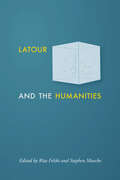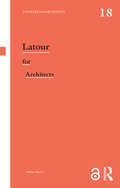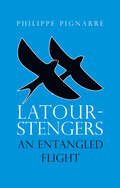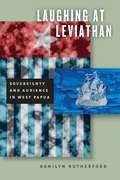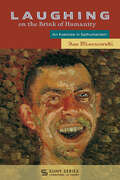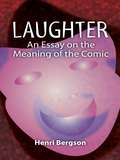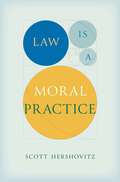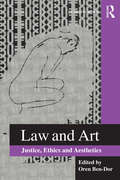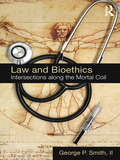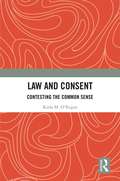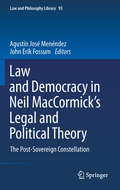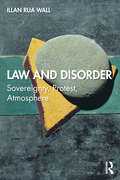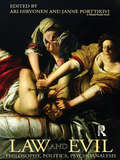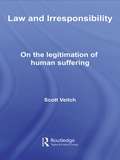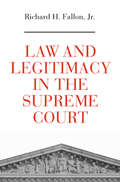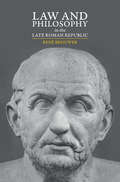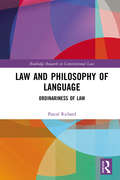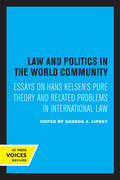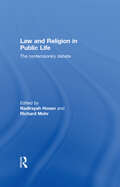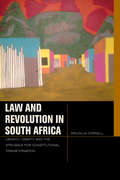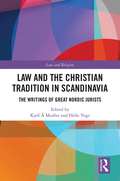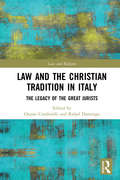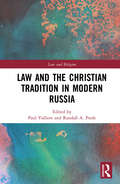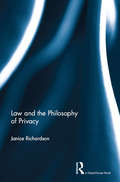- Table View
- List View
Latour and the Humanities
by Rita Felski and Stephen MueckeHow does the work of influential theorist Bruno Latour offer a fresh angle on the practices and purposes of the humanities?In recent years, defenses of the humanities have tended to argue along predictable lines: the humanities foster empathy, the humanities encourage critical thinking, the humanities offer a counterweight to the cold calculations of the natural and social sciences. The essays in Latour and the Humanities take a different approach. Exploring the relevance of theorist Bruno Latour's work, they argue for attachments and entanglements between the humanities and the sciences while looking closely at the interests, institutions, and intellectual projects that shape the humanities within and beyond the university. The collection, which is written by a group of highly distinguished scholars from around the world, is divided into two sections. In the first part, authors engage in depth with Latour's work while also rethinking the ties between the humanities and the sciences. Essays argue for greater attention to the nonhuman world, the urgency of climate change, and more nuanced views of universities as institutions. The second half of the volume contains essays that reflect on Latour's influence on the practices of specific disciplines, including art, the digital humanities, film studies, and political theory.Inspiring conversation about the relevance of actor-network-theory for research and teaching in the humanities, Latour and the Humanities offers a substantial introduction to Latour's work while discussing the humanities without falling back on the genres of either the sermon or the jeremiad. This volume will be of interest to all those searching for fresh perspectives on the value and importance of humanistic disciplines and thought.Contributors: David J. Alworth, Anders Blok, Claudia Breger, Dipesh Chakrabarty, Yves Citton, Steven Connor, Gerard de Vries, Simon During, Rita Felski, Francis Halsall, Graham Harman, Antoine Hennion, Casper Bruun Jensen, Bruno Latour, Heather Love, Patrice Maniglier, Stephen Muecke, Barbara Herrnstein Smith, Nigel Thrift, Michael Witmore
Latour for Architects (Thinkers for Architects)
by Albena YanevaBruno Latour is one of the leading figures in Social Sciences today, but his contributions are also widely recognised in the arts. His theories ‘flourished’ in the 1980s in the aftermath of the structuralism wave and generated new concepts and methodologies for the understanding of the social. In the past decade, Latour and his Actor-Network Theory (ANT) have gained popularity among researchers in the field of architecture. Latour for Architects is the first introduction to the key concepts and ideas of Bruno Latour that are relevant to architects. First, the book discusses critically how specific methods and insights from his philosophy can inspire new thinking in architecture and design pedagogy. Second, it explores examples from architectural practice and urban design, and reviews recent attempts to extend the methods of ANT into the fields of architectural and urban studies. Third, the book advocates an ANT-inspired approach to architecture, and examines how its methodological insights can trace new research avenues in the field, reflecting meticulously on its epistemological offerings. Drawing on many lively examples from the world of architectural practice, the book makes a compelling argument about the agency of architectural design and the role architects can play in re-ordering the world we live in. Following Latour’s philosophy offers a new way to handle all the objects of human and nonhuman collective life, to re-examine the role of matter in design practice, and to redefine the forms of social, political and ethical associations that bind us together in cities.
Latour-Stengers: An Entangled Flight
by Philippe PignarreCertain great friendships have left their mark in the annals of philosophy – and, without a doubt, the friendship of Bruno Latour and Isabelle Stengers is among them. Although they wrote very few texts together, their intellectual companionship lasted for over thirty years, and their respective work can be fully understood only when the many interconnections of their thought are brought to the fore. Latour and Stengers occupy the same starting place, one which remains at the heart of their work: scientific practice, which is the pride of modernity. Why do we Moderns define ourselves as those who know, while others are condemned to be only believers? This question led Latour and Stengers to the same fundamental question: how to understand and live in what Latour calls “the new climatic regime” and what Stengers calls “catastrophic times”? Philippe Pignarre’s aim is not to try to sort out which ideas belong to whom but rather to interweave their thought even more. In so doing, he sheds new light on the origins and development of their work at the same time as he documents an exceptional intellectual adventure between two of the leading thinkers of our age.
Laughing at Leviathan: Sovereignty and Audience in West Papua
by Danilyn RutherfordFor West Papua and its people, the promise of sovereignty has never been realized, despite a long and fraught struggle for independence from Indonesia. In Laughing at Leviathan, Danilyn Rutherford examines this struggle through a series of interlocking essays that drive at the core meaning of sovereignty itself--how it is fueled, formed, and even thwarted by pivotal but often overlooked players: those that make up an audience. Whether these players are citizens, missionaries, competing governmental powers, nongovernmental organizations, or the international community at large, Rutherford shows how a complex interplay of various observers is key to the establishment and understanding of the sovereign nation-state. Drawing on a wide array of sources, from YouTube videos to Dutch propaganda to her own fieldwork observations, Rutherford draws the history of Indonesia, empire, and postcolonial nation-building into a powerful examination of performance and power. Ultimately she revises Thomas Hobbes, painting a picture of the Leviathan not as a coherent body but a fragmented one distributed across a wide range of both real and imagined spectators. In doing so, she offers an important new approach to the understanding of political struggle.
Laughing on the Brink of Humanity: An Exercise in Epihumanism (SUNY series, Literature . . . in Theory)
by Jan MiernowskiWhat does it mean to be human? And, more precisely, what does it mean to be human now, with both humanism and the humanities in crisis? In answer to these questions, Laughing on the Brink of Humanity seeks not some essence of the human but rather an epiphenomenal manifestation—a sign of the human. The book finds such a sign in the joyless, painful, and often deadly laughter that resonates when we cross the barrier between what is human and what is not: animality, machinery, divinity. Jan Miernowski brings together a wide swath of discourses and figures, from Plato and the Bible through early modern humanism, to Friedrich Nietzsche, Georges Bataille, Hannah Arendt, Claude Lanzmann, Spike Jonze, Tom Stoppard, and Michel Houellebecq. Looking for laughter on the brink of humanity—in literature and philosophy, natural science and film, theology and computer science—the book offers an exercise in epihumanism appropriate to our posthuman age.
Laughter: An Essay on the Meaning of the Comic
by Henri Bergson Cloudesley Brereton Fred RothwellIn this great philosophical essay, Henri Bergson explores why people laugh and what laughter means. Written at the turn of the twentieth century, Laughter explores what it is in language that makes a joke funny and what it is in us that makes us laugh.One of the functions of humor, according to Bergson, is to help us retain our humanity during an age of mechanization. Like other philosophers, novelists, poets, and humorists of his era, Bergson was concerned with the duality of man and machine. His belief in life as a vital impulse, indefinable by reason alone, informs his perception of comedy as the relief we experience upon distancing ourselves from the mechanistic and materialistic. "A situation is always comic," Bergson notes, "if it participates simultaneously in two series of events which are absolutely independent of each other, and if it can be interpreted in two quite different meanings." The philosopher's thought-provoking insights (e.g., "It seems that laughter needs an echo. Our laughter is always the laughter of a group.") keep this work ever-relevant as a thesis on the principles of humor.
Law Is a Moral Practice
by Scott HershovitzA powerful argument for the essential role of morality in law, getting at the heart of key debates in public life.What is law? And how does it relate to morality? It’s common to think that law and morality are different ways of regulating our lives. But Scott Hershovitz says that this is a mistake: law is a part of our moral lives. It’s a tool we use to adjust our moral relationships. The legal claims we advance in court, Hershovitz argues, are moral claims. And our legal conflicts are moral conflicts.Law Is a Moral Practice supplies fresh answers to fundamental questions about the nature of law and helps us better appreciate why we disagree about law so deeply. Reviving a neglected tradition of legal thought most famously associated with Ronald Dworkin, Hershovitz engages with important legal and political controversies of our time, including recent debates about constitutional interpretation and the obligations of citizens and officials to obey the law.Leavened by entertaining personal stories, guided by curiosity rather than ideology, moving beyond entrenched dichotomies like the opposition between positivism and natural law, Law Is a Moral Practice is a thought-provoking investigation of the philosophical issues behind real-world legal debates.
Law and Art: Justice, Ethics and Aesthetics
by Oren Ben-DorIn engaging with the full range of 'the arts', contributors to this volume consider the relationship between law, justice, the ethical and the aesthetic. Art continually informs the ethics of a legal theory concerned to address how theoretical abstractions and concrete oppressions overlook singularity and spontaneity. Indeed, the exercise of the legal role and the scholarly understanding of legal texts were classically defined as ars iuris - an art of law - which drew on the panoply of humanist disciplines, from philology to fine art. That tradition has fallen by the wayside, particularly in the wake of modernism. But approaching art in that way risks distorting the very inexpressibility to which art is attentive and responsive, whilst remaining a custodian of its mystery. The novelty and ambition of this book, then, is to elicit, in very different ways, styles and orientations, the importance of the relationship between law and art. What can law and art bring to one another, and what can their relationship tell us about how truth relates to power? The insights presented in this collection disturb and supplement conventional accounts of justice; inaugurating new possibilities for addressing the origin of violence in our world.
Law and Authority in British Legal History, 1200–1900
by Mark GodfreyBy presenting original research into British legal history, this volume emphasises the historical shaping of the law by ideas of authority. The essays offer perspectives upon the way that ideas of authority underpinned the conceptualisation and interpretation of legal sources over time and became embedded in legal institutions. The contributors explore the basis of the authority of particular sources of law, such as legislation or court judgments, and highlight how this was affected by shifting ideas relating to concepts of sovereignty, religion, political legitimacy, the nature of law, equity and judicial interpretation. The analysis also encompasses ideas of authority which influenced the development of courts, remedies and jurisdictions, international aspects of legal authority when questions of foreign law or jurisdiction arose in British courts, the wider authority of systems of legal ideas such as natural law, the authority of legal treatises, and the relationship between history, law and legal thought.
Law and Bioethics: Intersections Along the Mortal Coil
by George P. Smith IIGeorge P. Smith, II is a leading figure in the world of medical law and ethics. During his long career he has addressed some of the most important issues in bioethics and has contributed much original thought to debates in the field. This book celebrates his contribution to scholarship in this area and brings together his key writings in bioethics. The chapters include previously published material which has been substantially updated to reflect recent developments in medicine and law. The book covers topics such as: human rights and medical law; the allocation of resources and distributive justice; ethical relativism; science and religion; and public health emergencies. Taken as a whole, this book examines the extent to which law, medicine, economics, and bioethics interact as synergistic vectors of force in shaping and setting both personal and public responses to the complexities of biotechnology, or what has been referred to as "The New Biology." All too often, past considerations of this topic have neglected to recognise the synergistic influences of law as a catalyst for codifying contemporary values into normative standards. Professor Smith reaches the conclusion that if traditional bioethical principles are to be seen as pertinent constructs for policy making, they must be broadened through the law of public health and Human rights. Law and Bioethics: Intersections along the Mortal Coil casts law as the pivotal force in bringing stability to the ongoing debates on how to maintain bioethical relevance in decision making and in so doing, it offers an excellent overview of the current bioethical issues in medical law considered in light of recent and ongoing technological developments in medicine. This book will be of particular interest to academics and students of Law, Political Science, Philosophy and Economics.
Law and Consent: Contesting the Common Sense
by Karla M. O'ReganConsent is used in many different social and legal contexts with the pervasive understanding that it is, and has always been, about autonomy – but has it? Beginning with an overview of consent’s role in law today, this book investigates the doctrine’s inseparable association with personal autonomy and its effect in producing both idealised and demonised forms of personhood and agency. This prompts a search for alternative understandings of consent. Through an exploration of sexual offences in Antiquity, medical practice in the Middle Ages, and the regulation of bodily harm on the present-day sports field, this book demonstrates that, in contrast to its common sense story of autonomy, consent more often operates as an act of submission than as a form of personal freedom or agency. The book explores the implications of this counter-narrative for the law’s contemporary uses of consent, arguing that the kind of freedom consent is meant to enact might be foreclosed by the very frame in which we think about autonomy itself. This book will be of interest to scholars of many aspects of law, history, and feminism as well as students of criminal law, bioethics, and political theory.
Law and Democracy in Neil MacCormick's Legal and Political Theory: The Post-Sovereign Constellation
by John Erik Fossum Agustín José MenéndezThis volume offers a collection of articles by leading legal and political theorists. Originally intended as a celebration of MacCormick's work on the occasion of the completion of the four-volume series on Law, State and Practical Reason, it has turned into a homage and salute after MacCormick's passing. Cast in MacCormick's reflexive spirit, the book presents a critical reconstruction of the Scottish philosopher's work, with the aim of revealing the connections between law and democracy in his writings and furthering his insights in each specific field. Neil MacCormick made outstanding contributions to the understanding of law and democracy under conditions of pluralism. His institutional theory of law has elucidated the close connection between the normative character of law as a means of social integration and legal social practices. This has produced a synthesis of the key insights of the legal and political theories of Kelsen, Hart, Alexy and Dworkin, and has broken new ground by undermining the 'monolithic' and 'nation-state' centered character of standard legal theories.
Law and Disorder: Sovereignty, Protest, Atmosphere
by Illan rua WallFocusing on the moment when social unrest takes hold of a populace, Law and Disorder offers a new account of sovereignty with an affective theory of public order and protest. In a state of unrest, the affective architecture of the sovereign order begins to crumble. The everyday peace and calm of public space is shattered as sovereign peace is challenged. In response, the state unleashes the full force of its exceptionality, and the violence of public order policing is deployed to restore the affects and atmospheres of habitual social relations. This book is a work of contemporary critical legal theory. It develops an affective theory of sovereign orders by focusing on the government of affective life and popular encounters with sovereignty. The chapters explore public order as a key articulation between sovereignty and government. In particular, policing of public order is exposed as a contemporary mode of exceptionality cast in the fires of colonial subjection. The state of unrest helps us see the ordinary affects of the sovereign order, but it also points to crowds as the essential component in the production of unrest. The atmospheres produced by crowds seep out from the squares and parks of occupation, settling on cities and states. In these new atmospheres, new possibilities of political and social organisation begin to appear. In short, crowds create the affective condition in which the settlement at the heart of the sovereign order can be revisited. This text thus develops a theory of sovereignty which places protest at its heart, and a theory of protest which starts from the affective valence of crowds. This book’s examination of the relationship between sovereignty and protest is of considerable interest to readers in law, politics and cultural studies, as well as to more general readers interested in contemporary forms of political resistance.
Law and Evil: Philosophy, Politics, Psychoanalysis
by Ari Hirvonen Janne PorttikiviLaw and Evil opens, expands and deepens our understanding of the phenomenon of evil by addressing the theoretical relationship between this phenomenon and law. Hannah Arendt said 'the problem of evil will be the fundamental question of post-war intellectual life in Europe'. This statement is, unfortunately, more than valid in the contemporary world: not only in the events of war, crimes against humanity, terror, repression, criminality, violence, torture, human trafficking, and so on; but also as evil is used rhetorically to condemn these acts, to categorise their perpetrators, and to justify forcible measures, both in international and domestic politics and law. But what is evil? Evil as a concept is too often taken as something that is self-evident, something that is always already defined. Taking Kant’s concept of radical evil as a starting point, this volume counters such a tendency. Bringing together philosophical, political, and psychoanalytical perspectives, in analysing both the concept and the phenomenon of evil, the contributors to this volume offer a rich and thoroughgoing analysis of the multifaceted phenomenon of evil and its relationship to law.
Law and Irresponsibility: On the Legitimation of Human Suffering
by Scott VeitchLaw is widely assumed to provide contemporary society with its most important means of organizing responsibility. Across a broad range of areas of social life – from the activities of states and citizens, to work, business and private relationships – it is understood that legal regulation plays a crucial role in defining and limiting responsibilities. But Law and Irresponsibility pursues the opposite view: it explores how law organizes irresponsibility. With a particular focus on large-scale harms – including extensive human rights violations, forms of colonialism, and environmental or nuclear devastation – this book analyzes the ways in which law legitimates human suffering by demonstrating how legal institutions operate as much to deflect responsibility for harms suffered as to acknowledge them. Drawing on a series of case studies, it shows not only how law facilitates the dispersal and disavowal of responsibility, but how it does so in consistent and patterned ways. Irresponsibility is organized, and its organization is traced here to the legal forms, and the social and political conditions, that sustain ‘our’ complicity in human suffering. This innovative and interdisciplinary book provides a radical challenge to conventional thinking about law and legal institutions. It will be of considerable interest to those working in law, political and legal theory, sociology and moral philosophy.
Law and Legitimacy in the Supreme Court
by Richard H. Fallon Jr.Richard Fallon offers theories of constitutional law and judicial legitimacy that accept many tenets of legal realism but reject its corrosive cynicism. Based on an ideal of good faith, his account both illuminates current practice and prescribes urgently needed responses to a legitimacy crisis in which the Supreme Court is increasingly enmeshed.
Law and Philosophy in the Late Roman Republic
by René BrouwerThe middle of the second until the middle of the first century BCE is one of the most creative periods in the history of human thought, and an important part of this was the interaction between Roman jurists and Hellenistic philosophers. In this highly original book, René Brouwer shows how jurists transformed the study of law into a science with the help of philosophical methods and concepts, such as division, rules and persons, and also how philosophers came to share the jurists' preoccupations with cases and private property. The relevance of this cross-fertilization for present-day law and philosophy cannot be overestimated: in law, its legacy includes the academic study of law and the Western models of dispute resolution, while in philosophy, the method of casuistry and the concept of just property.
Law and Philosophy of Language: Ordinariness of Law (Routledge Research in Constitutional Law)
by Pascal RichardAcademic legal production, when it focuses on the study of law, generally grasps this concept on the basis of a reference to positive law and its practice. This book differs clearly from these analyses and integrates the legal approach into the philosophy of normative language, philosophical realism and pragmatism. The aim is not only to place the examination of law in the immanence of its practice, but also to take note of the fact that legal enunciation must be taken seriously. In order to arrive at this analysis, it is necessary to go beyond traditional perspectives and to base reflection on an investigation of the conditions for enunciating law in our democracies. This analysis thus offers a renewal of the ethics inherent in the action of jurists and an original reflection on the role of certain legal tools such as concepts, categories, or "provisions". In this sense, the work nourishes its originality not only by the transversality of its approach, but also by the will to situate legal thought in concrete forms of its implementation. The book will be essential reading for academics working in the areas of legal theory, legal philosophy and constitutional theory.
Law and Politics in the World Community: Essays on Hans Kelsen's Pure Theory and Related Problems in International Law
by George A. LipskyThis title is part of UC Press's Voices Revived program, which commemorates University of California Press’s mission to seek out and cultivate the brightest minds and give them voice, reach, and impact. Drawing on a backlist dating to 1893, Voices Revived makes high-quality, peer-reviewed scholarship accessible once again using print-on-demand technology. This title was originally published in 1953.
Law and Religion in Public Life: The Contemporary Debate
by Richard Mohr Nadirsyah HosenWith religion at centre stage in conflicts worldwide, and in social, ethical and geo-political debates, this book takes a timely look at relations between law and religion. To what extent can religion play a role in secular legal systems? How do peoples of various faiths live successfully by both secular laws as well as their religious laws? Are there limits to freedom of religion? These questions are related to legal deliberations and broader discussions around secularism, multiculturalism, immigration, settlement and security. The book is unique in bringing together leading scholars and respected religious leaders to examine legal, theoretical, historical and religious aspects of the most pressing social issues of our time. In addressing each other’s concerns, the authors ensure accessibility to interdisciplinary and non-specialist audiences: scholars and students in social sciences, human rights, theology and law, as well as a broader audience engaged in social, political and religious affairs. Five of the book’s thirteen chapters address specific contemporary issues in Australia, one of the most ethnically diverse countries in the world and a pioneer of multicultural policies. Australia is a revealing site for contemporary studies in a world afraid of immigration and terrorism. The other chapters deal with political, legal and ethical issues of global significance. In conclusion, the editors propose increasing dialogue with and between religions. Law may intervene in or guide such dialogue by defending the free exchange of religious ideas, by adjudicating disputes over them, or by promoting a civil society that negotiates, rather than litigates.
Law and Revolution in South Africa: uBuntu, Dignity, and the Struggle for Constitutional Transformation (Just Ideas)
by Drucilla CornellThe relation between law and revolution is one of the most pressing questions of our time. As one country after another has faced the challenge that comes with the revolutionary overthrow of past dictatorships, how one reconstructs a new government is a burning issue.South Africa, after a long and bloody armed struggle and a series of militant uprisings, negotiated a settlement for a new government and remains an important example of what a substantive revolution might look like. The essays collected in this book address both the broader question of law and revolution and some of the specific issues of transformation in South Africa.
Law and The Christian Tradition in Scandinavia: The Writings of Great Nordic Jurists (Law and Religion)
by Kjell Å Modéer and Helle VogtThis book presents a comprehensive history of law and religion in the Nordic context. The entwinement of law and religion in Scandinavia encompasses an unusual history, not widely known yet important for its impact on contemporary political and international relations in the region. The volume provides a holistic picture from the first written legal sources of the twelfth century to the law of the present secular welfare states. It recounts this history through biographical case studies. Taking the point of view of major influential figures in church, politics, university, and law, it thus presents the principal actors who served as catalysts in ecclesiastical and secular law through the centuries. This refreshing approach to legal history contributes to a new trend in historiography, particularly articulated by a younger generation of experienced Nordic scholars whose work is featured prominently in this volume. The collection will be a valuable resource for academics and researchers working in the areas of Legal History and Law and Religion.
Law and the Christian Tradition in Italy: The Legacy of the Great Jurists (Law and Religion)
by Rafael Domingo Orazio CondorelliFirmly rooted on Roman and canon law, Italian legal culture has had an impressive influence on the civil law tradition from the Middle Ages to present day, and it is rightly regarded as "the cradle of the European legal culture." Along with Justinian’s compilation, the US Constitution, and the French Civil Code, the Decretum of Master Gratian or the so-called Glossa ordinaria of Accursius are one of the few legal sources that have influenced the entire world for centuries. This volume explores a millennium-long story of law and religion in Italy through a series of twenty-six biographical chapters written by distinguished legal scholars and historians from Italy and around the world. The chapters range from the first Italian civilians and canonists, Irnerius and Gratian in the early twelfth century, to the leading architect of the Second Vatican Council, Pope Paul VI. Between these two bookends, this volume offers notable case studies of familiar civilians like Bartolo, Baldo, and Gentili and familiar canonists like Hostiensis, Panormitanus, and Gasparri but also a number of other jurists in the broadest sense who deserve much more attention especially outside of Italy. This diversity of international and methodological perspectives gives the volume its unique character. The book will be essential reading for academics working in the areas of Legal History, Law and Religion, and Constitutional Law and will appeal to scholars, lawyers, and students interested in the interplay between religion and law in the era of globalization.
Law and the Christian Tradition in Modern Russia (Law and Religion)
by Paul Valliere and Randall A. PooleThis book, authored by an international group of scholars, focuses on a vibrant central current within the history of Russian legal thought: how Christianity, and theistic belief generally, has inspired the aspiration to the rule of law in Russia, informed Russian philosophies of law, and shaped legal practices. Following a substantial introduction to the phenomenon of Russian legal consciousness, the volume presents twelve concise, non-technical portraits of modern Russian jurists and philosophers of law whose thought was shaped significantly by Orthodox Christian faith or theistic belief. Also included are chapters on the role the Orthodox Church has played in the legal culture of Russia and on the contribution of modern Russian scholars to the critical investigation of Orthodox canon law. The collection embraces the most creative period of Russian legal thought—the century and a half from the later Enlightenment to the Russian emigration following the Bolshevik Revolution. This book will merit the attention of anyone interested in the connections between law and religion in modern times.
Law and the Philosophy of Privacy
by Janice RichardsonSituating privacy within the context of political philosophy, this book highlights the way in which struggles concerning the meaning of privacy have always been political. Different conceptions of privacy are here shown to involve diverse assumptions about ontology: our conceptions of self, culture, society and communication. Privacy theory’s debt to Locke, Kant or Mill, and what is at stake in their conceptual frameworks, is examined. The extent to which the term "privacy" has been used to the detriment of - and to create - weaker parties in marriage, in the workplace and now as citizens (or non-citizens) and consumers, as well as employees, is also demonstrated. In contrast, Janice Richardson pursues the relevance of Floridi’s philosophy of information, before turning to her application of Spinoza, the philosopher of communication, in order to outline a more useful framework through which to think about privacy today. The book will be of interest to those working in political philosophy, feminist philosophy, law, the philosophy of information, sociology, media, and cultural studies.
